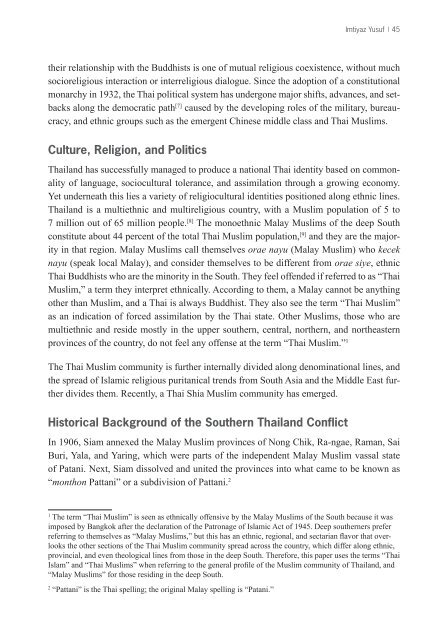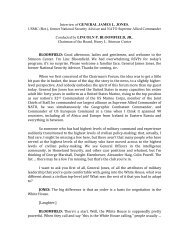Islam and Politics - The Stimson Center
Islam and Politics - The Stimson Center
Islam and Politics - The Stimson Center
You also want an ePaper? Increase the reach of your titles
YUMPU automatically turns print PDFs into web optimized ePapers that Google loves.
Imtiyaz Yusuf | 45<br />
their relationship with the Buddhists is one of mutual religious coexistence, without much<br />
socioreligious interaction or interreligious dialogue. Since the adoption of a constitutional<br />
monarchy in 1932, the Thai political system has undergone major shifts, advances, <strong>and</strong> setbacks<br />
along the democratic path [7] caused by the developing roles of the military, bureaucracy,<br />
<strong>and</strong> ethnic groups such as the emergent Chinese middle class <strong>and</strong> Thai Muslims.<br />
Culture, Religion, <strong>and</strong> <strong>Politics</strong><br />
Thail<strong>and</strong> has successfully managed to produce a national Thai identity based on commonality<br />
of language, sociocultural tolerance, <strong>and</strong> assimilation through a growing economy.<br />
Yet underneath this lies a variety of religiocultural identities positioned along ethnic lines.<br />
Thail<strong>and</strong> is a multiethnic <strong>and</strong> multireligious country, with a Muslim population of 5 to<br />
7 million out of 65 million people. [8] <strong>The</strong> monoethnic Malay Muslims of the deep South<br />
constitute about 44 percent of the total Thai Muslim population, [9] <strong>and</strong> they are the majority<br />
in that region. Malay Muslims call themselves orae nayu (Malay Muslim) who kecek<br />
nayu (speak local Malay), <strong>and</strong> consider themselves to be different from orae siye, ethnic<br />
Thai Buddhists who are the minority in the South. <strong>The</strong>y feel offended if referred to as “Thai<br />
Muslim,” a term they interpret ethnically. According to them, a Malay cannot be anything<br />
other than Muslim, <strong>and</strong> a Thai is always Buddhist. <strong>The</strong>y also see the term “Thai Muslim”<br />
as an indication of forced assimilation by the Thai state. Other Muslims, those who are<br />
multiethnic <strong>and</strong> reside mostly in the upper southern, central, northern, <strong>and</strong> northeastern<br />
provinces of the country, do not feel any offense at the term “Thai Muslim.” 1<br />
<strong>The</strong> Thai Muslim community is further internally divided along denominational lines, <strong>and</strong><br />
the spread of <strong>Islam</strong>ic religious puritanical trends from South Asia <strong>and</strong> the Middle East further<br />
divides them. Recently, a Thai Shia Muslim community has emerged.<br />
Historical Background of the Southern Thail<strong>and</strong> Conflict<br />
In 1906, Siam annexed the Malay Muslim provinces of Nong Chik, Ra-ngae, Raman, Sai<br />
Buri, Yala, <strong>and</strong> Yaring, which were parts of the independent Malay Muslim vassal state<br />
of Patani. Next, Siam dissolved <strong>and</strong> united the provinces into what came to be known as<br />
“monthon Pattani” or a subdivision of Pattani. 2<br />
1<br />
<strong>The</strong> term “Thai Muslim” is seen as ethnically offensive by the Malay Muslims of the South because it was<br />
imposed by Bangkok after the declaration of the Patronage of <strong>Islam</strong>ic Act of 1945. Deep southerners prefer<br />
referring to themselves as “Malay Muslims,” but this has an ethnic, regional, <strong>and</strong> sectarian flavor that overlooks<br />
the other sections of the Thai Muslim community spread across the country, which differ along ethnic,<br />
provincial, <strong>and</strong> even theological lines from those in the deep South. <strong>The</strong>refore, this paper uses the terms “Thai<br />
<strong>Islam</strong>” <strong>and</strong> “Thai Muslims” when referring to the general profile of the Muslim community of Thail<strong>and</strong>, <strong>and</strong><br />
“Malay Muslims” for those residing in the deep South.<br />
2<br />
“Pattani” is the Thai spelling; the original Malay spelling is “Patani.”

















